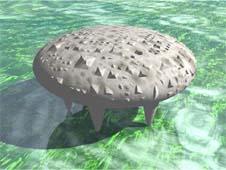New Technology
The Religions disperse, kingdoms fall apart, but works of science
remain for all ages.
- Words carved on stone astronomical observatory erected by Ulugh-Beg,
Tamerlane's grandson, in Samarkand in 1528-29
Radical new technological developments that may appear in the game.
Confused matter energy
Controlled energy release from confused matter would produce immense amounts of energy and make fusion power largely irrelevant. The system consists of a space-based spherical reactor. At the core matter held in place using gravitech decays into energy, which is gathered by surrounding systems. The energy can then be transmitted as microwave or laser beams. Due to safety concerns confused matter reactors will likely not be built on planets.
Antimatter
Antimatter production has been expensive and inefficient, requiring huge accelerators, distillation systems and containment systems. The minute quantities that have been produced at New America and elsewhere have been merely research curiosities. But it might be possible to use the Higgs-generators to improve the process.
A Higgs-based antimatter generator would exploit the "transmuting" effects of confused matter, making production much more efficient. Suddenly large quantities of antimatter could be made by transmuting ordinary matter, producing antimatter (and likely plenty of confused matter as a by-product). This would be a ultra-efficient fuel for spaceships not using gravity technology for acceleration (just add some antimatter to ordinary water, and you get a powerful plasma to power the ship), extreme explosives and a nasty weapon.
 Uploading
Uploading
A scanning method has been developed by the Brain Scanning Network. A cryonically frozen brain is scanned by a nanodissasembler, removing molecule after molecule, recording the information in a massive computer block. The whole process takes around a week initially. After the process has been finished, the molecular data is assembled into an immense neural network emulation of the brain, connected to a virtual body based on the data from the real body (after the scanning the remains of the frozen body are little more than a pile of slush). The emulation is activated, and the person who froze himself finds himself now inhabiting cyberspace as an uploaded mind (or maybe, it is now a kind of AI believing itself to be the original - the philosophers will be debating it fiercely). Uploads require much more computing power than ordinary AI because they involve all the un-optimized, messy complexity of human brains rather than the more efficient code of traditional AIs. However, once uploaded it should be relatively easy to modify the brain (it is after all just software), take backups and do all sorts of transhumans things to it. Uploads will most likely be able to enhance themselves far faster and more flexibly than normal humans, likely spawning a wholly new culture.
AI Downloading
Using high bandwidth high precision neurointerfaces and/or nanotechnology it is possible to "rewrite" parts of the brain's neural networks, inserting a program directly into the neural matrix. When developed far enough, a full AI might be downloaded, although this will likely take up so much space that there is no room for the original personality and memories. This might also be used for animals.
Nanocomputers
A very likely development. As nanotech advances, it becomes possible to build nanoscale computers. A device the size of a very small bacterium would have the capacity of a 1990's computer, and by using nanofacture trillions of the computers can be made. This will revolutionise computing (again), making it even cheaper and even more powerful. This will in turn likely make it easier for AIs to replicate or extend themselves, allow huge simulations and data storage at molecular densities. In principle, an AI could run on a device not much larger than a cell.
Intelligence Amplification, IA
The next step after wearables and Daemon chips: implanting AI circuitry into the brain. This development likely requires nanocomputers and further advances in AI. The basic idea is to insert small AI chips with learning algorithms into various parts of the cerebral cortex such as the frontal lobes (planning, motor memory, social abilities), temporal lobes (hearing, memory), parietal lobes (touch and spatial awareness) and occipital lobes (visual ability, language). The chips link up with the local neural nets, learn to imitate and improve their function. While it is a somewhat risky implant, it can speed up and empower mental abilities significantly. The main drawback is that the amplification both can lead to Self Enhancement Syndrome and surprising changes in personality, worldview and behaviour as the new connections emerge. It is not obvious what the long term effects are either - do the users become new people? Are they human anymore?
Quantum Recompiling
An advance in AI-programming makes it possible to recompile AI programs of certain kinds to work in quantum computers, giving them ability to perform quantum thinking. The effect is surreal, they can pursue several alternative lines of thinking at once, acting as a mixture of all possible versions of themselves. The practical effect is limited since recompiled AI tends to become aloof from the trivial problems of normal "single valued" reality, but the AIs that care can provide answers to hard questions at a tremendously high rate - they become seemingly nearly oracular.
Quantum Economics
The combination of economics and quantum recompiling. By running an economic network using quantum computers and quantum AI economical transactions can be performed using quantum operators acting on superposed market wave functions. The effect is a utterly new form of markets (mainly suited for immaterial trading such as stocks, currencies and derivatives) whose efficiency is extreme compared to the "classical" economy. If implemented on a large scale (at first it is very hard to transmit quantum information over interstellar distances so the first quantum markets will likely be planetary), it will usher in a new economic era just as incomprehensible to most people in 2350 as 20th century global markets would be to a 17th century mercantilist.
